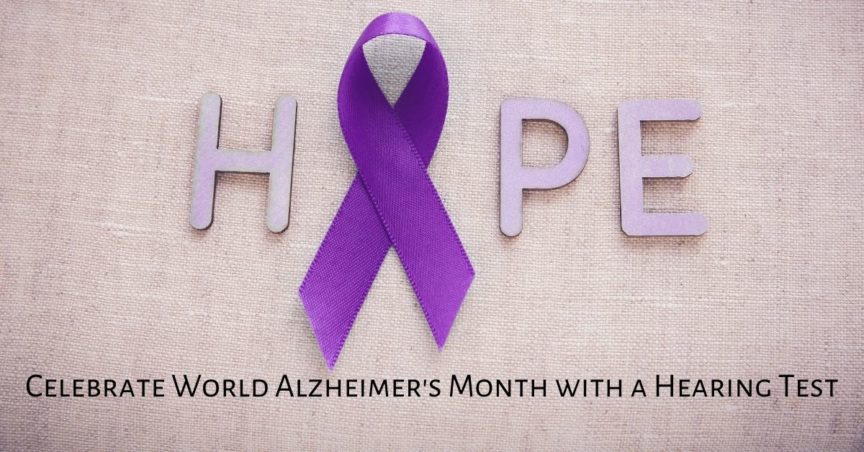- How to Care for Infants With Hearing Loss - April 15, 2024
- Hearing Aid Tips for Runners - April 5, 2024
- Overcoming Misconceptions Around Hearing Aids - March 27, 2024
It’s World Alzheimer’s Month, and there’s no better time to prioritize getting a hearing test. If you’re wondering about the correlation, you’re in the right place! Untreated hearing loss is a strong risk indicator for developing Alzheimer’s disease.
What Is Alzheimer’s Disease?
Alzheimer’s disease is the most common type of dementia, accounting for somewhere between 60-80% of cases. Dementia is a degenerative brain disorder that affects memory, cognitive ability, behavior and mood.
Those whose lives have been touched by Alzheimer’s disease know how devastating a disease it is. For the afflicted, moments of clarity punctuate a haze of terrifying confusion. Memories disappear or resurface with a veneer of reality. The present gives way to the past. Disorientation, fear, and distrust are constant companions.
After diagnosis, patients live an average of 4-8 years, though some have sustained for up to 20 years. While there are drugs on the market that can help slow the progress of Alzheimer’s disease, there is no cure or surefire preventative practice. The best advice we can follow to try to avoid developing Alzheimer’s disease is to eat well and exercise, though there is no guarantee.
Newly-Identified Risk Factors
The Lancet has just published a report that includes a list of risk factors that have been identified for Alzheimer’s disease. They estimate that the risk factors below account for 40% of global cases of Alzheimer’s, and addressing them will require individual efforts, societal efforts, and an increased campaign for public awareness of some of them. The 12 globally-identified risk factors for Alzheimer’s are as follows:
- Hearing loss
- Excessive alcohol consumption
- Traumatic brain injury
- Air pollution
- Inadequate education in the first 20 years of life
- Hypertension
- Smoking
- Obesity
- Later-life depression
- Lack of exercise
- Diabetes
- Social isolation
They specifically mention that more attention should be paid to untreated hearing loss. While we now know that age-related hearing loss can frequently indicate major underlying health concerns and cause a cascade of negative health outcomes, we’re doing a bad job of making this public knowledge, and the larger medical community still doesn’t address hearing loss as a serious health concern. The Lancet paper is significant in that it acknowledges that we should treat hearing loss more seriously for its link to Alzheimer’s disease.
Age-Related Hearing Loss
There’s a wide age range when age-related hearing loss can begin, from age 45 and up. One thing we know is that everyone suffers from it eventually: nearly 100% of centenarians have hearing loss. Age-related hearing loss is the result of damage to the cilia– the tiny, hair-like cells inside the cochlea in the inner ear, which transduce (convert) the mechanical energy of sound into the electrical signals that are received by the brain.
While there’s no known cure for this type of hearing loss, recent research by the Brigham and Women’s Hospital shows that an anti-inflammatory diet, such as the Alternate Mediterranean diet (AMED) and Dietary Approaches to Stop Hypertension (DASH) significantly delay its onset and slow its progress.
The cilia are some of the most delicate parts of the human body. It stands to reason that if something can protect these tiny cells, it might also have positive effects on other parts of the body. Indeed, an anti-inflammatory diet is indicated separately to help protect against Alzheimer’s, hypertension, and a host of other negative health outcomes.
Additionally, if the cilia seem to be sustaining damage at a higher rate than they should under normal circumstances, there might be an underlying condition at work. Indeed, it’s been shown that accelerated age-related hearing loss can indicate an underlying cardiovascular issue that could become acute if not addressed.
Hearing Tests are Medically Important
The non-profit Better Hearing Institute recommends getting a hearing test once every decade until age 50, and every three years after that. Regular hearing tests allow professionals to keep track of your hearing ability, and to alert you if hearing loss is beginning earlier or progressing faster than normal. It can often take a long time before hearing loss becomes noticeable to us, so a lot of unnecessary damage can occur before we even realize it.
If you’re due for a hearing test, make it a priority this month. Especially if your hearing loss is noticeable to you, getting hearing aids sooner than later will help prevent brain atrophy, stave off Alzheimer’s, and generally make life more enjoyable. Hearing aids today can do a lot, so talk to your audiologist about the options that are available and what might be best for you.

